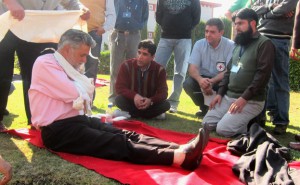On World Health Day (7 April, 2014), the ICRC renews its commitment to delivering emergency care to those in need. Since its inception, the ICRC has been striving to provide medical aid to the injured and the sick at remote locations across the globe. Our longstanding experience in this arena has accorded us an expertise and efficiency that is valued by countries across the world.
In India, besides healthcare in detention, a part of our activities are geared towards supporting the public health system in providing pre-hospital and hospital care to those caught in emergencies. We collaborate with the authorities and provide support to some of their healthcare programmes and emergency care trainings.
For instance, in Jammu and Kashmir, the ICRC lent technical support to a series of trainings organized by the health authorities in 2011 for their medical staff. The exercise was aimed at strengthening emergency response capacity in the state. However, emergency aid is not limited to the site of violence or incident. It needs to incorporate both pre-hospital care — first aid and Basic Life Saving (BLS) techniques aimed at sustaining life, reducing pain and minimizing the consequences of injury or illness until medical personnel take over — and hospital care, primarily emergency-room trauma care, to come full circle and save a person’s life.
Keeping this is mind, the Jammu and Kashmir Directorate of Health Services and the ICRC came together in 2013 to conduct an emergency room trauma course and a BLS training for medical staff managing such cases. The medicos who received these trainings, in turn, have trained over 4,000 people who are likely to be first-responders at sites of accidents and violence.
Globally, the ICRC is facing various challenges in delivering healthcare in emergencies. In the run-up to World Health Day, the ICRC published a report — ‘Violent Incidents Affecting the Delivery of Health Care’, based on a large number of recorded cases the world over, to raise awareness about attacks on people seeking or providing healthcare. The ICRC report is based on 1,809 incidents documented between January 2012 and December 2013 in 23 unnamed countries in which violence was used against patients, healthcare personnel, ambulances or medical facilities. The report clearly shows that the situation is not improving; health facilities are still being targeted, patients are being mishandled or even killed.
To read the report, click here:
World Health Day: Attacks on patients and health personnel continue
You can also view a gallery of photgraphs taken at a hospital at Kandahar in Afghanistan which shows the scale of the challenges faced by medical staff in transporting and treating patients on a daily basis.
Afghanistan: The challenge of caring for the sick and wounded in conflict-affected areas
Mediapersons can visit our video newsroom for raw TV footage of violent attacks on healthcare personnel and medical structures in South Sudan and the Central African Republic.
World Health Day – Health care in danger in conflicts globally
For more information log on to @HCIDproject, the Twitter account of the Red Cross Red Crescent’s Health Care in Danger project
ICRC New Delhi



